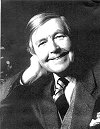
Rival Muses Arthur Butterworth - April 2001
Quite frequently I get into conversation with musical friends, many of them enthusiastic amateurs, who, because they are not professionals to whom the art is a serious business and means of earning a living, can enjoy the pursuit of it impartial1y, purely for their own pleasure and enjoyment, taking from it what appeals and ignoring that which does not. One of the most absorbing of interests nowadays is the acquisition of CD recordings. There was a time, perhaps sixty years ago or more, when collecting records might not have been all that popular. The technical state of scratchy 78's with limited duration was not universally attractive. However, since the early 1950's and the arrival of the LP record, the appeal is practically universal; everyone who has an interest in music of whatever kind, now possesses his or her own cherished collection. So many of my friends will tell me with great excitement about the latest recording they have just bought; asking if I have yet got hold of my own pristine copy.
However, my own collection is frankly not all that large. I have no 78's now, one of the few I did possess, Moeran's G minor symphony, has long since worn out, though I have a fair number of LPs, and a growing number of cassettes and now, of course, CDs. The reason is not on account of the quality of present-day recording technology but because of the music itself. Amateur musicians are fortunate in having no personal axe to grind, they can listen to every kind of music with absolute impartiality, they do not have to account for their choice. It is often quite remarkable how eclectic the taste of the majority of music lovers can be. Those of us in the profession can have wide tastes as well, but this is not invariably the case. Performing musicians: singers, chamber musicians, concert soloists, and conductors can more or less choose the repertoire they perform. but orchestral players (who are paid to play a repertoire whether they like it or not) have virtually no personal choice, and all-too-often have to slave away at things they positively detest. But, despite this, perhaps it is reasonable to assume that performers in general like the music they sing or play, otherwise they would not get involved in the performing business at all.
Composers are different. They are not primarily executant musicians, interpreting in their own way, what others have created. The composer is an individualist who strives most of all to persuade the world at large to listen to what he has to say rather than to pay attention to the creations of others. So, when someone says to me with unbounded enthusiasm that they have just bought a CD of XYZ's latest symphony, concerto, or whatever, or been to hear it in a live performance. I do not necessarily share their enthusiasm, nor am I invariably pleased to know of the latest craze for XYZ's music. No matter that he might even be a composer of the same cultural persuasion as myself, in the last resort I feel an intuitive sense that XYZ is my rival; I have an instinctive desire to promote and perpetuate my creative genes over those of other composers, just in the same way that in nature all living creatures strive for a supremacy in order to ensure the best conditions for the survival of their own genes in preference to those others of their kind, (much more so the genes of other species). Plants strive for the best position in the sun, for the best source of nutrients in the soil; animals, especially males, challenge each other for supremacy for the same purpose. Often the outcome is a fearsome confrontation until the strongest asserts his superiority. No one thinks it odd that there is rivalry in politics or business. At a trade fair each exhibitor suspiciously takes stock of his competitors, and were you by chance, to have a conversation with salesmen ABC and wax enthusiastic about the goods on offer from his rival DEF on the next stand, you could hardly expect ABC to be quite so impressed by DEF as you, in your impartial enthusiasm appear to be. It is often the same situation when people tell me about recent records they have bought; my natural instinct is to feel at least some twinge of envy that it is someone else's record my friend is so excited about; the natural response is to wish it had been mine he bad bought instead!
Of course this must sound awfully churlish, and it must be said that composers, like people in other walks of life, can appreciate the creative inspirations and achievements of others. Because we too are musicians we can, and do indeed like a vast amount of other music; much of it from the past has, after all, been a source of inspiration to our own creative urge. However, if composers were to be honest, I think that probably they do have rather more marked likes and dislikes regarding the work of composers, more so than performers, who do not' feel their 'own position - as performers - is in any way challenged by composers. However, when it comes to conductors' or any other performing artists' interpretations of this or that, they are naturally as jealous of their rivals in their own field as composers - or lions in the pride, bulls in the herd, or any other living creature striving to assert dominance. The rivalries of prima donnas in the late nineteenth century was legendary, and the disparaging comments of some jet-setting maestros about others who presume to wield the baton can be as derisive as those of rival politicians at election time.
 Return to
index
Return to
index